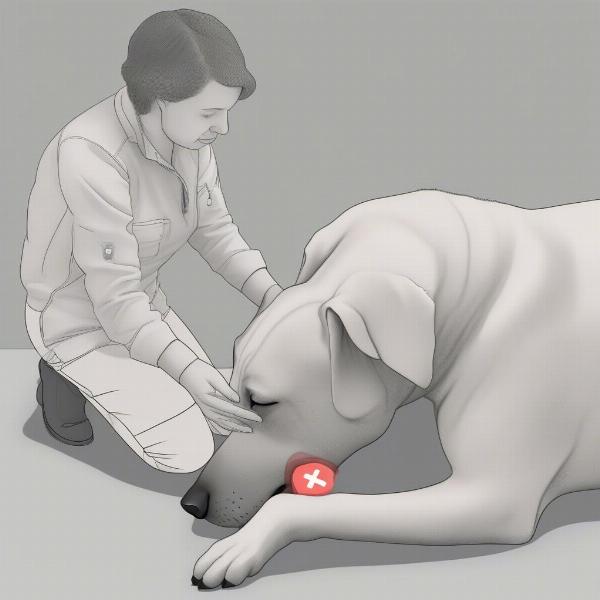A dog’s heart, much like a human’s, is located in the chest cavity, slightly to the left side. Knowing the precise location of your dog’s heart can be crucial for a variety of reasons, from performing CPR to understanding the symptoms of potential heart conditions. This article will guide you through the specifics of a dog’s heart location, its function, and signs to look out for if you suspect a problem.
Understanding the placement of your furry friend’s heart is a fundamental aspect of responsible pet ownership. It allows you to better understand their physiology and recognize potential health issues. Beyond its anatomical location, understanding the heart’s function and common health concerns related to it will enable you to provide the best possible care for your companion.
Pinpointing the Exact Location
While we say the heart is on the left, it’s not completely over there. Imagine drawing a line from your dog’s left elbow up towards its chest. The heart sits roughly between the 5th and 7th ribs in this region. It’s nestled between the lungs and protected by the ribcage.
Feeling for your dog’s heartbeat can be a useful way to monitor their health. Place your hand flat against their chest, just behind their left elbow. You should be able to feel a gentle thump. This is their heartbeat.
Why Knowing the Location Matters
Knowing where your dog’s heart is located is vital for several reasons:
- Performing CPR: In emergencies, knowing the correct hand placement for chest compressions can be life-saving.
- Monitoring Heart Health: Being familiar with the location makes it easier to detect any abnormalities in heartbeat or rhythm.
- Understanding Symptoms: If your dog is experiencing discomfort in the chest area, knowing the heart’s position can help you assess the potential seriousness of the situation.
 Performing CPR on a dog
Performing CPR on a dog
Common Heart Issues in Dogs
Just like humans, dogs can suffer from various heart conditions. Some of the most common include:
- Heartworm Disease: This serious and potentially fatal condition is caused by parasitic worms that live in the heart and lungs. affordable heartworm prevention for dogs and inexpensive heartworm prevention for dogs can help prevent this.
- Dilated Cardiomyopathy (DCM): This disease causes the heart muscle to weaken and enlarge, making it less efficient at pumping blood.
- Valvular Heart Disease: This involves abnormalities in the heart valves, which can lead to heart murmurs and other problems.
Knowing the signs of heart problems can help you seek timely veterinary care for your dog. These signs may include coughing, difficulty breathing, exercise intolerance, and fainting. what natural supplement help with heart worms in dogs might be a question you’d like to explore if you’re considering natural preventative options.
How Can I Tell If My Dog’s Heart is Healthy?
Regular veterinary check-ups are essential for monitoring your dog’s heart health. Your vet will listen to their heart, check their pulse, and may recommend further tests such as X-rays or an electrocardiogram (ECG) if needed. beef hearts for dogs can be a good addition to your dog’s diet but consult your vet about appropriate portions.
Conclusion
Understanding where a dog’s heart is located, how it functions, and potential health concerns can help you become a more informed and proactive pet owner. Regular check-ups, a healthy diet, and appropriate exercise are key to maintaining your dog’s cardiovascular health.
FAQ
- Q: Where exactly is my dog’s heart? A: A dog’s heart is located in their chest, slightly to the left side, between the 5th and 7th ribs.
- Q: How can I find my dog’s heartbeat? A: Place your hand flat against their chest, just behind their left elbow.
- Q: What are the common signs of heart problems in dogs? A: Coughing, difficulty breathing, exercise intolerance, and fainting can be signs of heart issues.
- Q: How often should my dog’s heart be checked by a vet? A: Annual check-ups are recommended for most dogs, but your vet may recommend more frequent visits depending on your dog’s age and health.
- Q: Can heartworm be prevented? A: Yes, preventative medications are available and highly recommended.
- Q: What should I do if I think my dog is having a heart attack? A: Seek immediate veterinary attention.
- Q: Are there medications for dogs with heart problems? A: Yes, several medications are available to manage various heart conditions in dogs. heart tablets for dogs are available but should only be given under veterinary supervision.
ILM Dog is your trusted resource for expert advice on dog care and well-being. We offer comprehensive information on breeds, health, training, nutrition, grooming, and much more. Our mission is to empower dog owners worldwide with the knowledge and tools to provide the best possible care for their canine companions. From breed selection to senior dog care, ILM Dog is your go-to guide for every stage of your dog’s life. Contact us today for personalized advice: Email: [email protected], Phone: +44 20-3965-8624. ILM Dog is here to support you and your furry friend on every step of your journey together.